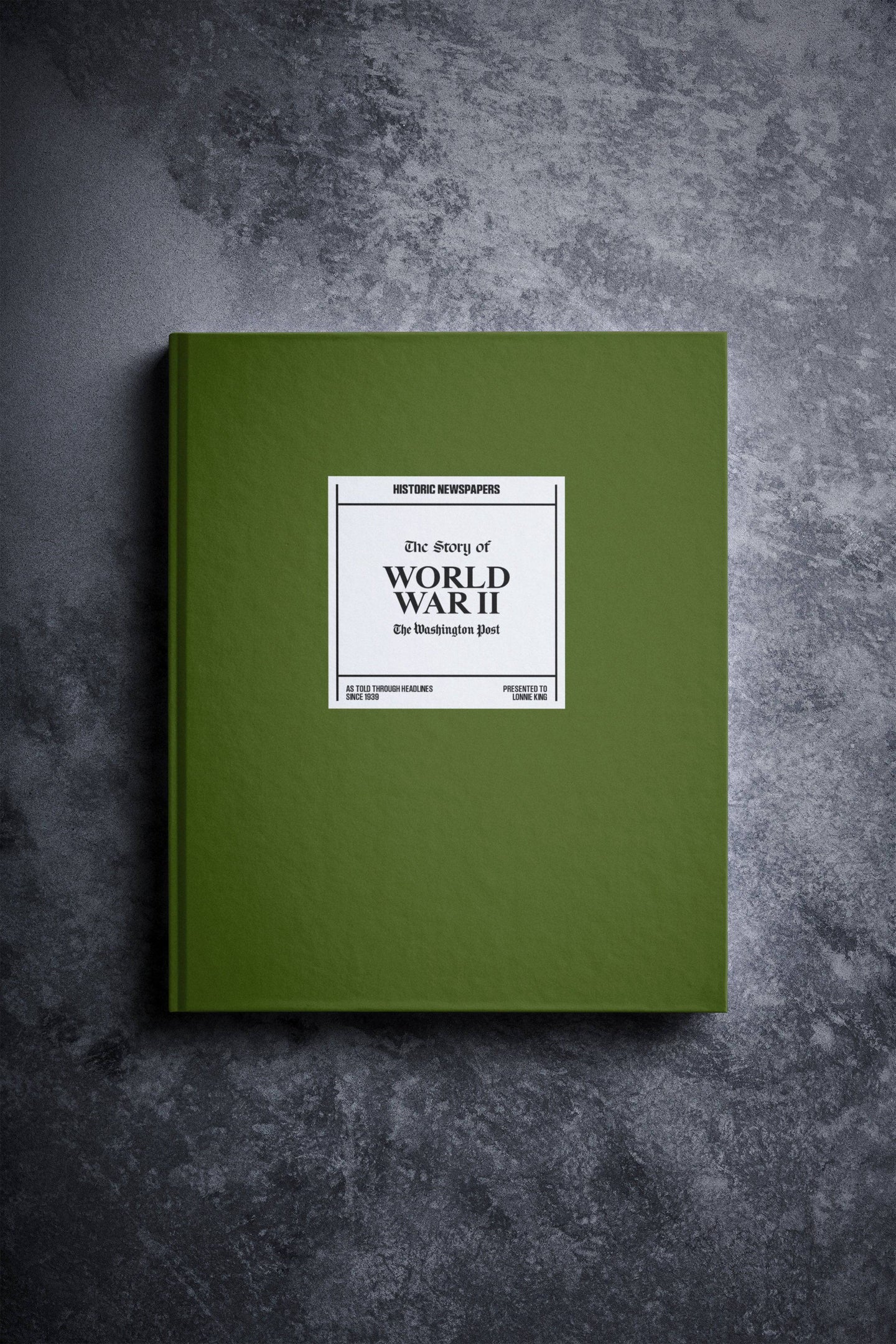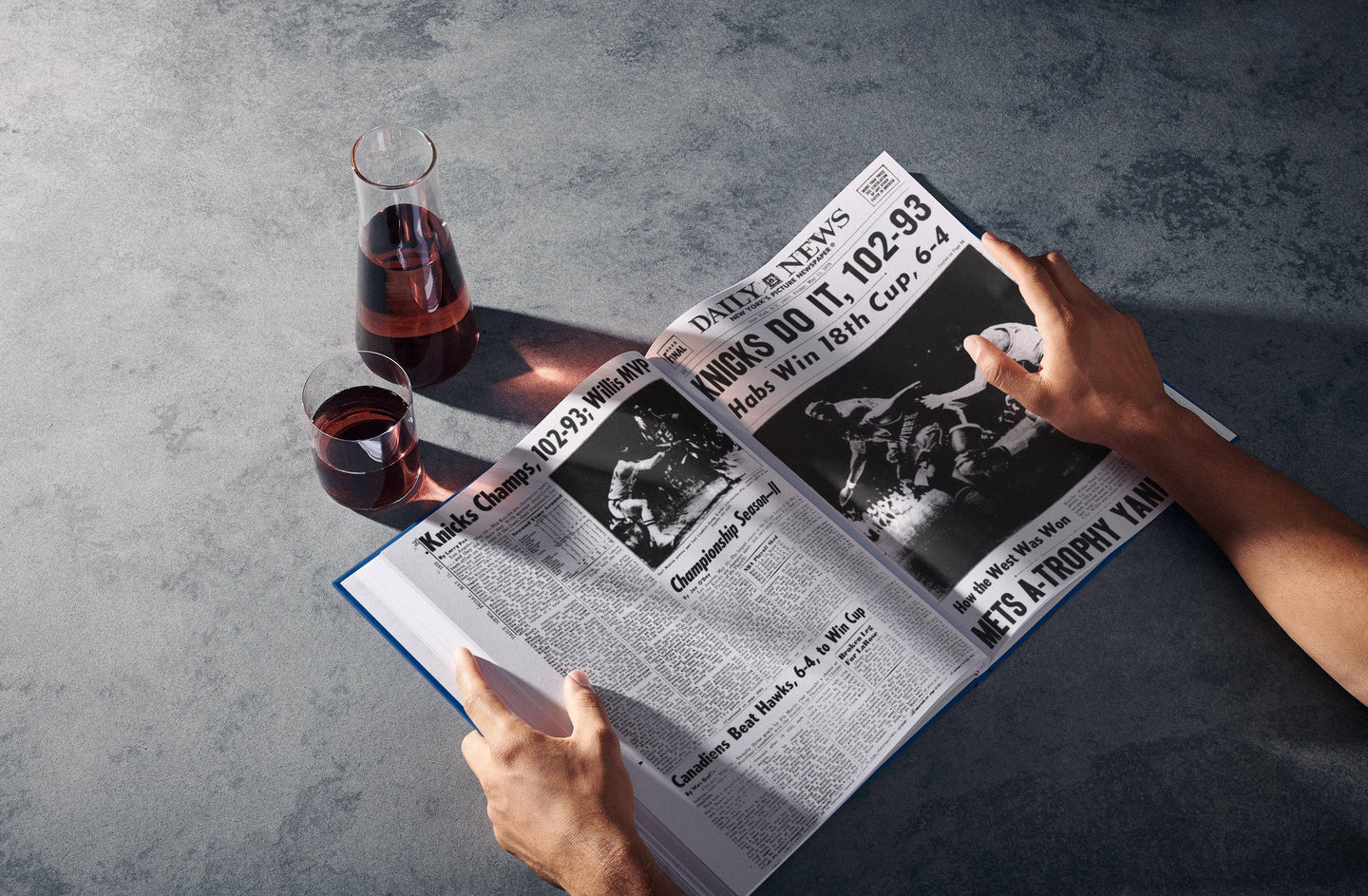Ahead of the 80th anniversary of one of the most pivotal events in World War II, we take a look back at how Operation Torch was reported in several British newspapers over a four-day period, offering a rare glimpse into how the press perceived and processed the battle as it happened.
To revisit the other events that dominated news coverage eighty years ago, check out our exquisite collection of authentic 1942 newspapers.
Turn the page to:
What Was Operation Torch?
In late 1942, right in the middle of the Second World War, Allied forces invaded Morocco and Algeria, two colonies under the control of Vichy France, the authoritarian French state, which was at that point aligned with Nazi Germany. American General (and future President) Dwight D. Eisenhower, along with British Prime Minister Winston Churchill, plotted a three-pronged attack on Casablanca, Oran and Algiers, beginning November 8.
Vichy France, led by Admiral Francoise Darlan, defended the territories by land and by sea, but, after seeing over 1,300 of their troops killed and just under another 2,000 injured, as well as several ships and submarines destroyed, were forced to surrender in all three locations.
Torch was viewed as the perfect operation to transfer French power from Vichy to Free France, the country’s government-in-exile, and to engage the United States in the fight against Nazi Germany. The operation was the first mass involvement of US troops in the Mediterranean theatre.
November 9
“U.S. Forces in Algiers and Oran”
The first Operation Torch WW2 article we’ll look at is the November 9, 1942 edition of the Times. On page 4, the paper reports the very first stage of Operation Torch:
“The United States War Department announced last night that United States occupation forces had landed yesterday at Oran and Algiers in French North Africa. All three arms of the United States forces took part, supported by units of the Royal Navy and the R.A.F. Beaches were seized by air-borne troops and United States Rangers.”
“The object of the landing is to free North Africa from the Axis menace – the first step towards the liberation of France.”
“Heavy Vichy Losses in Big Sea Battle”
On the same day, both the Daily Express and the Star offered later, more up-to-date reports of the developments that had occurred through the night.
The Star’s front page coverage led with a report on the landing at Casablanca:
“As Allied forces carried out new landings in North Africa, Vichy radio announced this afternoon that Casablanca, the big port on the Moroccan Atlantic coast, was directly threatened by several regiments of infantry which had landed at the entrance to the town. Considerable losses in the fighting were admitted.”
“Another admission, made in a Vichy communique, was that French forces had suffered serious losses in a violent naval battle off Casablanca. The port had been shelled.”
The article goes on to state that U.S. troops were now moving inland with little resistance.

““Cease Fire” at Algiers”
The Express, on the front page, went with an article on the storming of Algiers, the first solid victory of the operation, less than 24 hours after its beginning. The article leads with a transcription of a Vichy radio message from Algiers:
“A suspension of hostilities at Algiers was signed, with Darlan’s authorisation, between the French Commander-in-Chief of North Africa and the commander of the American troops.”
The article goes on to describe the initial resistance met by the Allied forces at sea:
“At Algiers light French naval units, which ignored General Eisenhower’s order that they should “stay put,” sallied out of the harbour, but were driven back by Allied warships. The coastal defences at Algiers sank two Allied vessels in the harbour, but the big guns of some of the mightiest warships afloat poured fire into the coast batteries. The opposition in the harbours was more than being made up for by the land advances of the American troops.”
The Star expands further on those land advances, quoting a Vichy communiqué which explained the reasoning behind the Algiers armistice:
“The America shock troops were equipped with automatic weapons and were far superior in numbers and material. When they attacked they were supported by lorries with machine-guns and even by tanks.”

“Tens and Tens of Thousands of Men”
The Express front page also featured an article described as the first story from their “Invasion reporter”. It spoke of the “tens upon tens of thousands of Americans” (the total Allied forces were later confirmed to have totalled over 100,000) taking part in the landings:
“They were brought to the Mediterranean in the largest troopship and supply convoy in history, supported by the greatest Allied naval array of the war.”
The article also spoke of the timing of the operation:
“It is timed to trap Rommel’s Afrika Korps in a pincer movement with the Eight Army from Egypt.”
… and the planning of it:
“Every phase of the operation, its size, scope, and other facts, is the result of months of the most careful secret planning, and leaves no doubt of the opening of a continuous Allied offensive to secure Africa for the United Nations”.
A final Express front page “2 A.M. latest” column features an Allied communiqué from just past midnight, stating that “several important airfields have been occupied” and that most of the resistance faced had been “mainly confined to navy and coast defence artillery.”
On page four, the Express suggests that the Vichy’s ships must be no match for the combined force of the Royal and American Navies, and also features an Operation Torch map showcasing the entire Mediterranean warzone.

“November 10”
“Penetration to the rear of Oran”
On November 10, the Times acknowledged the details reported in the Star and Express the day before, while also focusing on the action in Oran, the most central of the three landing locations:
“It was officially announced by allied headquarters last night that American troops have penetrated a considerable distance to the rear of Oran after meeting stiff local resistance at several points.”
The Times also featured an announcement from Allied Headquarters regarding Algiers, delivered the previous evening. It said:
“At 7 o’clock G.M.T. yesterday (Sunday) the occupation of Algiers and the immediate vicinity was started. Arrangements for the occupation of the city were made at a conference between Major-General Charles W. Ryder, United States Army, Commander of the Eastern Assault Force, and General Alphonse Pierre Juin.”

November 11
“Fighting Ends In French North Africa”
On November 11, the Times summarised the position at all three landing locations:
“It was officially announced yesterday that Oran has been captured by American troops with the support of the Royal Navy”.
“American dive-bombers and heavy warships have bombarded the harbour of Casablanca, leaving the French battleship Jean Bart ablaze.”
“It is confirmed that British land and air forces have been put ashore in Algeria.”
The same day, the News Chronicle went one step further, insinuating that a declaration of the operation being completed was now a matter of “when” rather than “if”, with an armistice statement expected hourly:
“With the fall of Oran and Algiers, key ports controlling more than 1,000 miles of Mediterranean coastline, Casablanca, the great Moroccan naval base, was the last important centre of resistance in the whole of the French North African colonies.”
“Latest reports of the Casablanca fighting said the port was surrounded; the harbour was being dive-bombed and bombarded; the 35,000-ton battleship Jean Bart was on fire; and Vichy’s light naval forces hampering American disembarkation were wiped out.”

“How Oran, Algiers Were Taken”
With only Casablanca left to fall, another News Chronicle article detailed exactly how the other two cities had been conquered in the days prior:
“A TASK force of tanks and infantry at midnight began moving east towards Oran from a point west of Fort Mers el Kebir. At 7.20 this morning it was three miles from the centre of the city. At the same time another force which had also begun moving at midnight, but from the east, was seven miles from the heart of Oran. Then General Fredendall launched the final assault while the British Navy bombarded the harbour”.
“Dusty American troops today occupied Algiers, while Axis bombers intermittently attacked the city. At 1 a.m. we waded ashore with shock troops at Sidi Ferruch, 15 miles east of Algiers. It was 5.15 p.m. on Sunday when the bugler at Fort L’Emporeur, the western gateway of the city, sounded “Cease Fire”.
“Why (And When) Allies Chose N.W. Africa”
The News Chronicle also ran an article detailing how and when Operation Torch was decided upon by both President Roosevelt and British Prime Minister Winston Churchill, beginning with the overall scale of the attack, which at their first meeting was decided to be too much a risk in 1942, without a reasonable chance of success. But then:
“When the President asked Mr. Churchill to make another visit to the U.S. in May or June the issue was whether there should be an offensive on a very large scale in the middle of 1943, or whether an offensive on a smaller scale, presenting fewer problems of transportation and manufacture, should be started in 1942.”
Next, a location was decided:
“Various possibilities of offensives were surveyed, but by the end of June there was general agreement on an African offensive, and by the end of July certain fundamental points of attack – numbers of men involved, shipping problems and manufacturing problems – were determined.”
And finally, an exact time:
“The approximate date of the offensive was decided, the President said, by the end of August. When this date was fixed he and Mr. Churchill sat back to take with a smile, or, perhaps, it would be better to say on the chin, the public demands for a Second Front.”
“November 12”
“Capitulation of Algeria and Morocco”
On November 12, the Times reported on the apparent “End of the First Phase”:
“French forces in Algeria and Morocco capitulated yesterday morning and the first phase of the North African campaign has ended. American and British forces have occupied Bougie, 110 miles east of Algiers. Axis fighters and bombers have arrived in Tunisia.”
The Times also heralded Adolf Hitler’s retaliation, declaring that a defence against the Allied attack was “imminent”:
“German forces yesterday entered Unoccupied France. In a message to Marshal Pétain, Hitler asserted that they were doing so for the purpose of defending Southern France and Corsica against imminent allied attack. The Marshal immediately protested against this violation of the armistice terms.”

Aftermath
There can be no doubt regarding who won Operation Torch. The Allied victory caused Admiral Darlan to cooperate, and led to Free France, led by Charles de Gaulle, taking over most Vichy possessions. It also laid the foundations for America’s post-war policy in the Middle East.
Less than two months after his deal with Eisenhower, which had seen him installed as High Commissioner of France for North and West Africa, Darlan was assassinated by a 20-year-old monarchist.
The Economist has speculated that the reason the operation is often not given the credit it deserves is because the initial enemy was the French, generally associated as being a member of the Allied forces, and for this reason it is often considered too complicated a chapter to include as part of the typical WWII narrative.



























Follow us